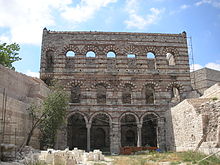| This article needs additional citations for verification. Please help improve this article by adding citations to reliable sources. Unsourced material may be challenged and removed. Find sources: "Constantine Palaiologos" son of Michael VIII – news · newspapers · books · scholar · JSTOR (September 2023) (Learn how and when to remove this message) |


Constantine Palaiologos or Palaeologus (Greek: Κωνσταντῖνος Παλαιολόγος; 1261 – 5 May 1306) was a Byzantine prince of the Palaiologos dynasty, who also served as a general in the wars against the Serbs and Turks.
Biography
Constantine was the third son of Emperor Michael VIII Palaiologos (r. 1259–1282) and Theodora Palaiologina. He was born in autumn 1261 in Constantinople, which had just been recovered from the Latin Empire in August. He was hence a true porphyrogennetos ("purple-born") prince, and was often referred to as such. His father reportedly accorded him honours above even those of a despotes.
In 1280, Constantine fought against the Serbs in Macedonia, and was then dispatched against the Turkish raiders in Asia Minor, where he was successful in clearing the Maeander River valley of their presence. He later rebuilt the famous Monastery of Stoudios in Constantinople. In 1293, he was slandered to his brother, Emperor Andronikos II Palaiologos (r. 1282–1328), and placed under arrest. He later became a monk, with the monastic name Athanasios. He died at Constantinople on 5 May 1306, and was buried at the Lips Monastery.
From his marriage to Irene Palaiologina Raoulaina, he had one son, the panhypersebastos John Palaiologos.
The Palace of the Porphyrogenitus is a late 13th-century Byzantine palace in the north-western part of the old city of Constantinople named after him.
References
- ^ Trapp, Erich; Beyer, Hans-Veit; Kaplaneres, Sokrates; Leontiadis, Ioannis (1989). "21492. Παλαιολόγος Κωνσταντῖνος". Prosopographisches Lexikon der Palaiologenzeit (in German). Vol. 9. Vienna: Verlag der Österreichischen Akademie der Wissenschaften. ISBN 3-7001-3003-1.
| The Palaiologoi of the Byzantine Empire | |
|---|---|
| |
| 1st generation | |
| 2nd generation | |
| 3rd generation | |
| 4th generation | |
| 5th generation | |
| 6th generation | |
| 7th generation | |
| 8th generation | |
| 9th generation | |
| 10th generation | |
| 11th generation | |
| 12th generation | |
| 13th generation | |
| 14th generation | |
| 15th generation | |
| Cadet branches | |
| Only male-line descendants who are independently notable are shown. | |
- 1261 births
- 1306 deaths
- 13th-century Byzantine people
- 14th-century Byzantine people
- Byzantine generals
- Palaiologos dynasty
- Byzantine–Turkish wars
- Porphyrogennetoi
- Eastern Orthodox monks
- Byzantine prisoners and detainees
- Burials at Lips Monastery
- Children of Michael VIII Palaiologos
- Sons of Byzantine emperors
- 13th-century Byzantine military personnel